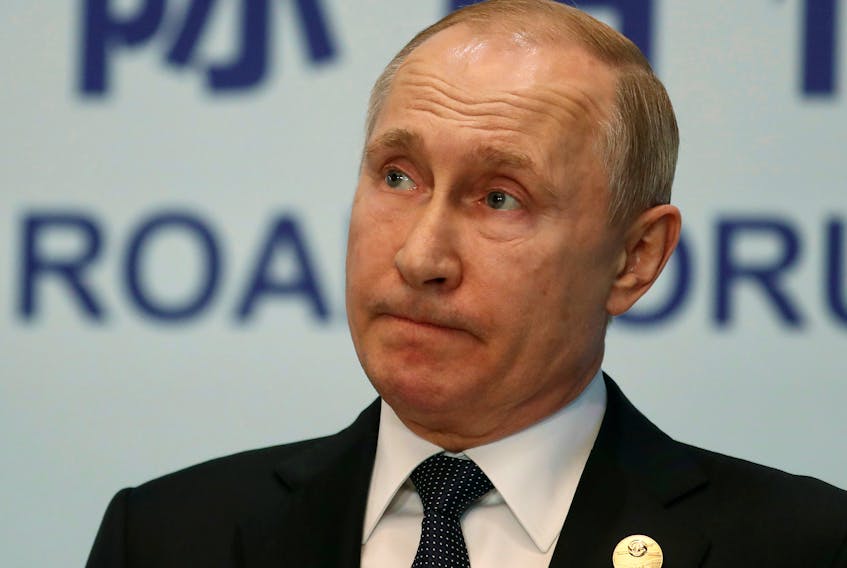The Russians are coming.
Canadian and international security experts “continue to identify threats to Canada’s democracy, ranging from foreign interference and influence efforts to cyber-attacks and attempts at disinformation.”
That’s straight from the Elections Canada website, and Elections Canada plays by Joe Friday’s rule: “Just the facts.”
The fact is Canadian voters will be the targets of lies, distortions and disinformation before and during this fall’s federal election campaign.
So what else is new? asks the quintessential cynic. Aren’t election campaigns always marked — or marred — by lies, distortions and disinformation?
To some extent they are, but this is different in that these lies, distortions and disinformation aren’t actually coming from the usual, and easily identifiable, political suspects.
Indeed, the source of this new insidious kind of lie is all part of the deception.
Malicious, foreign actors — yes, the Russians are suspect No. 1 — are intent on destabilizing Canadian society and undermining its democracy, and their success elsewhere should tell you that this is a threat to take seriously.
“The Russian government interfered in the 2016 presidential election in sweeping and systematic fashion,” is the first finding cited on the first page of the report from U.S. Special Counsel Robert Mueller. He also found the Russians favoured Donald Trump and when he won, Russian oligarchs celebrated it as a “Victory for Putin.”
The Russians may not have thrown the election to Trump, but can any serious person honestly maintain that American society hasn’t been destabilized and its democratic institutions undermined since the 2016 election?
The American presidency is a bigger trophy for Putin’s wall than anything he can bag in Canada, but since 2016, cyber attacks have targeted national elections in at least half of the democracies where elections have been held.
“We judge it very likely that foreign cyber interference against Canada would resemble activity undertaken against other advanced democracies in recent years,” the security experts tell us.
“Disinformation poisons public debate and is a threat to democracy. Raised public awareness is needed to distinguish the real from the false … there is no guarantee that even effective counter-campaigns can defeat the high volume flow of malicious communications.”
That’s from a document published last year by the Canadian Security Intelligence Service (CSIS) and based on the views of security experts at a CSIS-organized workshop.
The bottom line seems to be that it is impossible to eliminate, and difficult to even contain the attempts to mess with our election that are coming out of Russia and from other hostile players.
The most effective counter-measure is a vigilant electorate, voters with the ability to separate the fiction from the fact-based. Whether that seems like an adequate line of defence depends on your confidence in the sagacity of your fellow electors.
The fate of democracy has always rested, at least theoretically, in the hands of voters who are now required to up their game and discern between what is authentic and very sophisticated forgeries.
Elections Canada is on the lookout for websites and social media accounts and posts that attempt to “impersonate” it, and the elections referee counsels political parties and candidates to do the same.
The security experts confirm the most skilled national purveyor of falsehoods is Russia, whose historic mastery of “special measures” is magnified by modern technology. Here’s just one way they work:
“(A)gents of the Russian state can create a false story and ensure it reaches the segment population most likely to be influenced by it through Facebook, Twitter and other channels. They also appear to corroborate the story through news agency interviews featuring phony experts, forged documents, and doctored photos and videos. Anyone who challenges the lies becomes a target for high-volume online vilification.”
These are perilous and largely uncharted waters for democracies. The insidious nature of the threat is that it uses tolerance for a diversity of opinions against tolerant nations. The disinformation seeks to harden political polarization into hostile camps by amplifying the differences and demonizing the other side.
“Conventional journalism has been partially displaced by a torrent of data from an infinite number of originators. Within that torrent is a current of lies and distortions that threatens the integrity of public discourse, debate and democracy,” says the CSIS report.
We’ve been warned.









